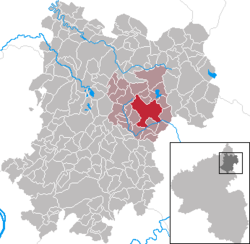Westerburg
| Westerburg | ||
|---|---|---|
|
||
| Coordinates: 50°33′50″N 7°58′21″E / 50.56389°N 7.97250°ECoordinates: 50°33′50″N 7°58′21″E / 50.56389°N 7.97250°E | ||
| Country | Germany | |
| State | Rhineland-Palatinate | |
| District | Westerwaldkreis | |
| Municipal assoc. | Westerburg | |
| Government | ||
| • Mayor | Ralf Seekatz (CDU) | |
| Area | ||
| • Total | 18.48 km2 (7.14 sq mi) | |
| Elevation | 343 m (1,125 ft) | |
| Population (2015-12-31) | ||
| • Total | 5,670 | |
| • Density | 310/km2 (790/sq mi) | |
| Time zone | CET/CEST (UTC+1/+2) | |
| Postal codes | 56457 | |
| Dialling codes | 02663 | |
| Vehicle registration | WW | |
| Website | www.westerburger-land.de | |
Westerburg is a small town of roughly 6,000 inhabitants in the Westerwaldkreis in Rhineland-Palatinate, Germany. The town is named after the castle built on a hill above the mediaeval town centre (Burg is German for “castle”)
The town lies in easternmost Rhineland-Palatinate, 4 km from the boundary with Hesse. It is the seat of the Verbandsgemeinde of Westerburg – a kind of collective municipality – which administers the town and 24 surrounding municipalities.
The former Ortsgemeinden – communities belonging to a Verbandsgemeinde – of Gershasen, Wengenroth and Sainscheid belong to the town of Westerburg.
The earliest witnesses to human beings settling in what is now Westerburg are some urns that point to cremations performed here about 700 BC.
The earliest documentary mention of the constituent community of Wengenroth is dated 9 November 879 from the time when Gebhard, Count of the Lahngau donated holdings here to the St. Severus Monastery in Gemünden.
The first time that Westerburg was named in a document came in 1209 when Siegfried III of Runkel acquired Westerburg by marrying a countess from the House of Leiningen and thereafter began calling himself Siegfried von Runkel und von Westerburg. Two of his sons had bequests from him: Siegfried IV of Runkel, whose seat was in Westerburg, and Dietrich I of Runkel, whose seat was in Runkel. Family squabbles began about 1250 and under Siegfried’s grandsons led to a permanent rift between the lordly houses of Westerburg and Runkel by 1288. Dietrich’s son Siegfried V of Runkel drove his cousin Heinrich out of Runkel, whereupon Siegfried, who was Siegfried IV’s son, began calling himself Heinrich I of Westerburg. There are express indications of settlement next to the castle for the first time in 1270.
...
Wikipedia



